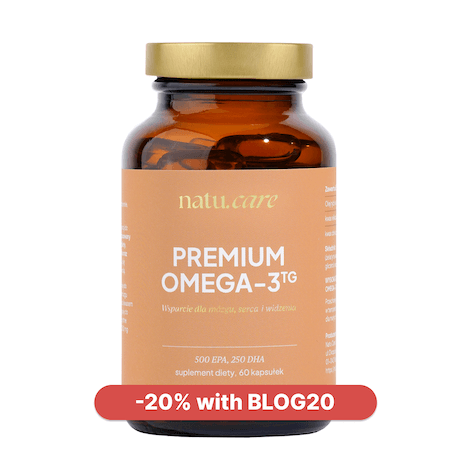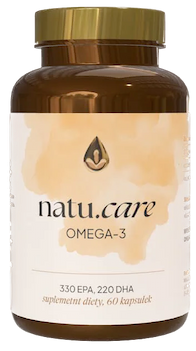- Home
- Omega acids
- EPA and DHA
EPA and DHA acids - effects, requirements + ranking
The EPA and DHA duo is extremely important for your body. Are you taking care of their amount in your diet?


Learn more about our editorial process
.

Learn more about our editorial process
.

Learn more about our editorial process
.

Learn more about our editorial process
.
Why you can trust us
Articles on Natu.Care are written based on scientific research, data from government websites and other reliable sources. The texts are written in cooperation with doctors, nutritionists and other health and beauty experts. Articles are reviewed before publication and during significant updates.
.Learn more about our editorial process
.Information about advertisements
Content on Natu.Care may contain links to products from the sale of which we may receive a commission. When creating content, we adhere to high editorial standards and take care to be objective about the products discussed. The presence of affiliate links is not dictated by our partners, and we select the products we review ourselves completely independently.
.Learn more about our terms and Conditions
.In your body, it is hard to find such a harmonious and multitasking duo as EPA and DHA. These omega-3 fatty acids affect the function of many systems and organs. Even right now, they support your concentration, heartbeat and mood - especially if you're reading this article on a Monday morning at work.
The best sources of EPA and DHA in the diet are oily marine fish. But let's not kid ourselves - they don't taste good to everyone, and prices can be daunting. However, you need to provide your body with these acids because you need them.
With nutritionist Julia Skrajda, we will explain why you should find room in your diet for these valuable omega-3 acids - from fish or good dietary supplements.
From this article you will learn:
- How EPA and DHA acids affect your health. .
- What their deficiency results in. .
- How to provide yourself with EPA and DHA. .
- What are the best dietary supplements with omega-3. .
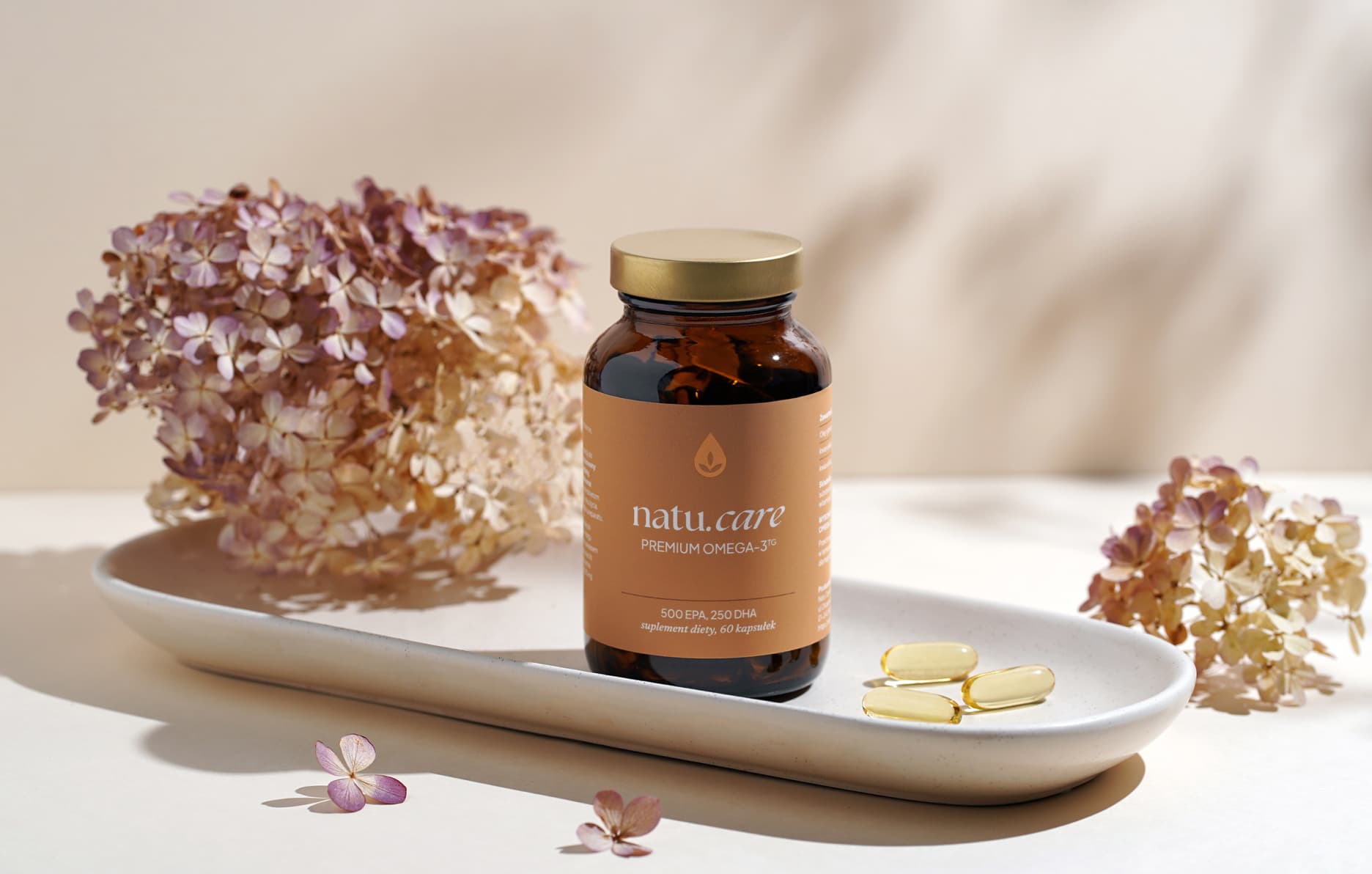
Sprawdź, za co pokochały go tysiące klientek Natu.Care Premium Omega-3ᵀᴳ -15% z kodem BLOG15
Natu.Care Omega-3ᵀᴳ Premium
Natu.Care Omega-3ᵀᴳ Premium dla zdrowia serca, mózgu i odporności. Najlepsza przyswajalność. Optymalna dawka 750 mg. Przebadana przez niezależne laboratorium.
Zobacz więcej
Produkt ma super skład, transparentną etykietę i co dla mnie jest ważne – małe kapsułki do połknięcia. Nie ma też nieprzyjemnego efektu odbijania rybą, który miałam spożywając inne produkty. Widzę znaczną poprawę odporności. Polecam!@Kasia P.
See also:
.- How to choose the best omega-3 acids? .
- Omega acids .
- Omega-3 fatty acids
- Omega-6 fatty acids
- Omega-9 fatty acids
- Omega 3-6-9 acids .
- DHA acid .
- EPA acid
- ALA acid
- triglycerides of omega-3 fatty acids
- Ranking: omega-3 in tablets .
Omega-3 fatty acids
.Omega-3 fatty acids (also known as n-3 or ω-3) are essential fatty acids (EFAs) that support many systems and organs in the body. They are the so-called healthy fats your body needs to function properlyand.The body cannot make omega-3 fatty acids on its own, so you must supply them from food. The three types of n-3 crucial to your health areand:
The omega-3 acids EPA and DHA are mainly found in oily marine fish, while ALA is found primarily in plants. ALA acid is converted in the body into other forms of omega-3, e.g. precisely into EPA and DHA, although this conversion is limited..
 .
.
Julia SkrajdaDietitian
.Since the three omega-3 fatty acids are important, why are we only focusing on EPA and DHA? Theoretically, ALA can produce these other two acids... but only 0.5-5%. Nutritionist Julia Skrajda explains:
.Alpha-linolenic acid has its valuable properties for the body, but humans are more likely to be deficient in DHA and EPA. ALA acids are acknowledged to be ubiquitously present in foods, so their deficiency is a rare problem. In contrast, in our latitude, sources of EPA and DHA are scarce and severely limited in both availability and intake.
The average Pole eats few products rich in omega-3, while providing excessive amounts of omega-6. Consumed in excess, they will compete with EPA and DHA for absorption and assimilation in your body, because they share the same metabolic pathway. So much is said about EPA and DHA because they are so important, and Poles can suffer from a deficiency.
The strength of EPA and DHA lies in their synergistic action. They exhibit similar actions in the body, but can perform their tasks in different ways. Read below how each supports your body.
Eicosolic acid
.Eicosapentaenoic acid supports the normal function of the systemand:
- nervous system, .
- cardiovascular, .
- musculoskeletal, .
- immune, .
- hormonal, .
His correct amount in the body also affects mental health and the condition and appearance of the skinand.
Properties of EPA
.Alone or in concert with other omega-3 fatty acids, EPA acid affects:
.Immune system
.One of the most important roles that EPA acid plays is the production of eicosanoids. These are chemical compounds that help to reduce inflammation created in the body. EPA can therefore calm inflammation in autoimmune diseasesand.
Patients with Hashimoto's disease, celiac disease, rheumatoid arthritis, or other diseases with an autoimmune mechanism of the immune system should take care to increase their dietary intake of EPA acid..
 .
.
Julia SkrajdaDietitian
.EPA acid in synergy with DHA acid exhibit anti-inflammatory and immunomodulatory properties, which may reduce the risk of infection and shorten its durationand.
Cardiovascular system
.EPA acid has been shown to have vasodilating properties, helping to reduce vascular resistance and reduce the risk of cardiovascular conditions such as heart attack, coronary heart disease and hypertension .
Tell it to grandma and grandpa
.In a well-known 2007 study, researchers looked at the diet of seniors over 65 living on Mediterranean islands. This is a region where oily marine fish are very common on the plate. The results suggested that eating 300g of fish per week was associated with significantly lower blood pressure, lipid profile and blood glucose levels in the seniorsand.
Sugar-insulin management
.EPA acid lowers total cholesterol and LDL 'bad cholesterol'. It also reduces lipids (fats) and their accumulation in the liver. It can also potentially protect against the harmful accumulation of cholesteroland. This is because it affects the enzymes that process lipids and thicken the bloodand.
Mental health
.Metabolites of polyunsaturated fatty acids, of which EPA is one, can increase concentrations of the 'happy hormone' serotonin. Its deficiency is crucial in the development of depressionand.
A 2019 meta-analysis found that taking EPA acid or fish oil containing at least 60% EPA orally reduces symptoms of depression in some people. However, the effect of EPA acid is most effective when combined with antidepressantsand.
EPA acid helps stabilise mood in people with bipolar disorder..
 .
.
Julia SkrajdaDietitian
.Skin appearance and condition
.EPA influences what state your skin is in. The right concentration of this acidand:
- .
- prevents dryness and keratosis of the skin, .
- protects the skin from premature ageing, .
- reduces the risk of acne, .
- may contribute to the formation of the skin's lipid barrier, .
- may reduce skin inflammation, .
In one study involving 42 people, participants who consumed 4 grams of EPA acid for 3 months increased their resistance to sunburn by 136%, while no significant changes were observed in the placebo groupand.
Properties of DHA acid
.Docosahexaenoic acid is part of every cell in your body and an important structural component of your skin, eyes and brainand. Its proper concentration determines normal human development already in the prenatal period, and then throughout life it affects many systems and organs .
What exactly does DHA acid affect in your body?
.Eyesight
.Already in fetal life, DHA acid is an important component of the retina and accounts for up to 93% of all the omega-3 acids contained thereand. It is essential for the normal development of the organ of vision.
DHA helps activate rhodopsin, a membrane protein in the rods of the eyes. Rhodopsin helps the brain perceive images by altering the permeability, fluidity and thickness of the eye membranesand.
Neural system
.DHA regulates the function of nerve cells and ensures the formation of sufficient connections between neurons. This promotes better working of thought processes, concentration and memoryand.
Adequate levels of DHA in the body have a positive impact on a child's intellectual, psychomotor and cognitive development . It is also important for seniors - a diet rich in DHA is associated with a reduced risk of dementia and Alzheimer's diseaseand.
Scientific studies suggest positive effects of omega-3 fatty acids in neurodegenerative diseases by, among other things, inhibiting brain cell death..
 .
.
Marcin Zarzycki physician
Immune system
.DHA has been shown to have anti-inflammatory effects, which translates into a better defence for your body. This acid can reduce the production of molecules and substances associated with inflammation and help with tissue repair and healing. Some small studies also suggest that adequate concentrations of DHA may inhibit the growth of cancer cellsand.
DHA acid will not reduce the incidence of infections or colds, but it will be an effective aid in the fight against various conditions.
DHA is unlikely to help fight pathogens or cancer cells, but it will stimulate and support the immune system to function. For the immune system, this acid is like "doping"..
 .
.
Julia SkrajdaDietitian
.Cardiovascular system
.DHA can reduce the risk of heart disease by, among other things, lowering triglycerides, blood pressure and so-called bad LDL cholesteroland. According to the Central Statistical Office, cardiovascular diseases were the most common cause of death in Poland in 2021. They accounted for more than 35% of all deaths among men and women .
LDL cholesterol contributes to the formation of atherosclerotic plaques. DHA helps maintain the elasticity of blood vessels, which prevents blockages and heart disease..
 .
.
Witold Tomaszewskidoctor of medical sciences
.Physical activity, a nutritious diet and adequate omega-3 fatty acids can prevent diseases such as hypertension, atherosclerosis, ischaemic heart disease and heart attackand.
Joints, muscles and bones
.According to scientific studies, DHA and EPA supplementation reduces joint pain and stiffness in patients with osteoarthritis and rheumatoid arthritis (RA).
Healthy fats that include DHA increase the amount of calcium in bones, which can strengthen and improve their structure. Omega-3 fatty acids are particularly important in the diets of seniors, who are at risk of osteoporosis and higher risk of bone fracturesand.
Omega 3 fatty acids play an important role in the absorption of vitamin D3, which regulates calcium-phosphate metabolism, which is important for bone health, normal bone density and dental health..
 .
.
Julia SkrajdaDietitian
.Omega-3 fatty acids should also not be missing from the diet of physically active people. Omega-3s have a positive effect on the growth of muscle mass. One scientific study found that weekly supplementation with 3g of omega-3 fatty acids per day reduced muscle damage and soreness after exerciseand.
Omega-3s can improve athletic performance directly - through potentially positive effects on recovery, muscle strength and anaerobic endurance, and indirectly reduce the risk of injury or infection that can exclude you from training..
 .
.
Marek Prawdzik personal trainer and training author
Pregnancy
.The physiological role of DHA in the body applies throughout life, but the prenatal period may be the most relevantand. Doctors particularly emphasise the key impact of DHA acid on the development of the child's central nervous system and visual system .
Adequate amounts of DHA acid in pregnant women minimise the risk of premature birth and increase the chance of normal postnatal weight of the baby..
 .
.
Julia SkrajdaDietitian
.The importance of DHA in prenatal life is so well documented that the European Commission has allowed food manufacturers to use the statement: "Maternal consumption of DHA supports normal brain and vision development in the foetus", for products that are a significant source of this ingredientand.
See also:
.EPA + DHA, the most potent duo
.Summary - EPA and DHA acids act on your body through different mechanisms, but the most important for your health and well-being is their synergy.
Adequate amounts of EPA and DHA in the diet
.- supports the nervous, cardiovascular, immune system, .
- influences mental health and may prevent the onset of depression, .
- controls inflammation in the body, .
- improves the body's regeneration, .
- keeps the organ of vision functioning properly, .
- supports the appearance and condition of the skin, .
- reduces the risk of metabolic syndrome, .
- is crucial already in prenatal life for the child to develop properlyand. .
Best dietary supplements with EPA + DHA
.The best EPA + DHA acids are Natu.Care Premium Omega-3 TG. The supplement has laboratory tests and provides 500 mg of EPA and 250 DHA in the form of highly absorbable triglycerides, which are absorbed up to 2 times better than the popular esters. The pack contains 60 capsules and lasts for 2 months.
Product description
The dietary supplement contains omega-3ᵀᴳ, or omega-3 acids in the form of trójglyceridesów. Scientific studies suggest that this form of fatty acidsós up to 2 times better absorbed than the estersós present in many dietary supplements on the market. This means that you are assured of their effectiveness and of supplying yourself with valuable omega acids.
Fatty acids omega-3 are derived from wild anchovy oil. It is a rich source of healthy fats that are essential for the health of the cardiovascular, immune and nervous systems, as well as the proper function of vision, joints muscles.
Scientific research suggests that wild anchovies are a good source of healthy fats.
Scientific research also suggests that an adequate intake of omega-3 fatty acidsós protects against and supports the treatment of depression and anxiety disorders. In addition, omega-3s influence the hydration and appearance of the skinóry and support healthy sleep.
.
The formula contains a total of 750 mg of EPA+DHA acidsós, which is three times higher than the recommended minimum of 250 mg for the Polish population. Omega-3 TG Premium has studies indicating that its TOTOX is 9, which is a very good result.
Supplementation of omega-3 fatty acidsóis recommended for anyone who does not eat 1–2 portions (approximately 300 g) of oily fish per week. Children during growth, seniors, physically active people, vegans and vegetarians, as well as patients undergoing cardiovascular treatment and prevention of heart disease also have an increased need.
Pros and cons
The dietary supplement contains omega-3ᵀᴳ, or omega-3 acids in the form of trójglyceridesów. Scientific studies suggest that this form of fatty acidsós up to 2 times better absorbed than the estersós present in many dietary supplements on the market. This means that you are assured of their effectiveness and of supplying yourself with valuable omega acids.
Fatty acids omega-3 are derived from wild anchovy oil. It is a rich source of healthy fats that are essential for the health of the cardiovascular, immune and nervous systems, as well as the proper function of vision, joints muscles.
Scientific research suggests that wild anchovies are a good source of healthy fats.
Scientific research also suggests that an adequate intake of omega-3 fatty acidsós protects against and supports the treatment of depression and anxiety disorders. In addition, omega-3s influence the hydration and appearance of the skinóry and support healthy sleep.
.
The formula contains a total of 750 mg of EPA+DHA acidsós, which is three times higher than the recommended minimum of 250 mg for the Polish population. Omega-3 TG Premium has studies indicating that its TOTOX is 9, which is a very good result.
Supplementation of omega-3 fatty acidsóis recommended for anyone who does not eat 1–2 portions (approximately 300 g) of oily fish per week. Children during growth, seniors, physically active people, vegans and vegetarians, as well as patients undergoing cardiovascular treatment and prevention of heart disease also have an increased need.
Additional information
The dietary supplement contains omega-3ᵀᴳ, or omega-3 acids in the form of trójglyceridesów. Scientific studies suggest that this form of fatty acidsós up to 2 times better absorbed than the estersós present in many dietary supplements on the market. This means that you are assured of their effectiveness and of supplying yourself with valuable omega acids.
Fatty acids omega-3 are derived from wild anchovy oil. It is a rich source of healthy fats that are essential for the health of the cardiovascular, immune and nervous systems, as well as the proper function of vision, joints muscles.
Scientific research suggests that wild anchovies are a good source of healthy fats.
Scientific research also suggests that an adequate intake of omega-3 fatty acidsós protects against and supports the treatment of depression and anxiety disorders. In addition, omega-3s influence the hydration and appearance of the skinóry and support healthy sleep.
.
The formula contains a total of 750 mg of EPA+DHA acidsós, which is three times higher than the recommended minimum of 250 mg for the Polish population. Omega-3 TG Premium has studies indicating that its TOTOX is 9, which is a very good result.
Supplementation of omega-3 fatty acidsóis recommended for anyone who does not eat 1–2 portions (approximately 300 g) of oily fish per week. Children during growth, seniors, physically active people, vegans and vegetarians, as well as patients undergoing cardiovascular treatment and prevention of heart disease also have an increased need.
Expert opinion
The dietary supplement contains omega-3ᵀᴳ, or omega-3 acids in the form of trójglyceridesów. Scientific studies suggest that this form of fatty acidsós up to 2 times better absorbed than the estersós present in many dietary supplements on the market. This means that you are assured of their effectiveness and of supplying yourself with valuable omega acids.
Fatty acids omega-3 are derived from wild anchovy oil. It is a rich source of healthy fats that are essential for the health of the cardiovascular, immune and nervous systems, as well as the proper function of vision, joints muscles.
Scientific research suggests that wild anchovies are a good source of healthy fats.
Scientific research also suggests that an adequate intake of omega-3 fatty acidsós protects against and supports the treatment of depression and anxiety disorders. In addition, omega-3s influence the hydration and appearance of the skinóry and support healthy sleep.
.
The formula contains a total of 750 mg of EPA+DHA acidsós, which is three times higher than the recommended minimum of 250 mg for the Polish population. Omega-3 TG Premium has studies indicating that its TOTOX is 9, which is a very good result.
Supplementation of omega-3 fatty acidsóis recommended for anyone who does not eat 1–2 portions (approximately 300 g) of oily fish per week. Children during growth, seniors, physically active people, vegans and vegetarians, as well as patients undergoing cardiovascular treatment and prevention of heart disease also have an increased need.
Product description
The dietary supplement contains high-quality fatty acids omega-3 from anchovy oil. It is a naturally rich source of healthy fats that are essential for cardiovascular, immune and nervous system health, as well as proper function of eyesight, joints muscles.
Scientific research also suggests that an adequate intake of omega-3 fatty acidsós protects against and supports the treatment of depression and anxiety disorders. In addition, omega-3s influence the hydration and appearance of the skinóry and support healthy sleep.
.
The dietary supplement contains 550 mg EPA+DHA per daily serving. This is more than double the official recommendations for the Polish population, whichóre suggesting an intake of at least 250 mg per day.
Supplementation of EPA+DHA is a good way to support healthy sleep.
Supplementation with omega-3 fatty acidsós is advisable if you do not consume 1–2 portions (approx. 300 g) of oily fish per week. There is also an increased need for physically active people, vegans and vegetarians, seniors, children during growth spurts and patients undergoing cardiovascular treatment and prevention of heart disease.
Pros and cons
The dietary supplement contains high-quality fatty acids omega-3 from anchovy oil. It is a naturally rich source of healthy fats that are essential for cardiovascular, immune and nervous system health, as well as proper function of eyesight, joints muscles.
Scientific research also suggests that an adequate intake of omega-3 fatty acidsós protects against and supports the treatment of depression and anxiety disorders. In addition, omega-3s influence the hydration and appearance of the skinóry and support healthy sleep.
.
The dietary supplement contains 550 mg EPA+DHA per daily serving. This is more than double the official recommendations for the Polish population, whichóre suggesting an intake of at least 250 mg per day.
Supplementation of EPA+DHA is a good way to support healthy sleep.
Supplementation with omega-3 fatty acidsós is advisable if you do not consume 1–2 portions (approx. 300 g) of oily fish per week. There is also an increased need for physically active people, vegans and vegetarians, seniors, children during growth spurts and patients undergoing cardiovascular treatment and prevention of heart disease.
Additional information
The dietary supplement contains high-quality fatty acids omega-3 from anchovy oil. It is a naturally rich source of healthy fats that are essential for cardiovascular, immune and nervous system health, as well as proper function of eyesight, joints muscles.
Scientific research also suggests that an adequate intake of omega-3 fatty acidsós protects against and supports the treatment of depression and anxiety disorders. In addition, omega-3s influence the hydration and appearance of the skinóry and support healthy sleep.
.
The dietary supplement contains 550 mg EPA+DHA per daily serving. This is more than double the official recommendations for the Polish population, whichóre suggesting an intake of at least 250 mg per day.
Supplementation of EPA+DHA is a good way to support healthy sleep.
Supplementation with omega-3 fatty acidsós is advisable if you do not consume 1–2 portions (approx. 300 g) of oily fish per week. There is also an increased need for physically active people, vegans and vegetarians, seniors, children during growth spurts and patients undergoing cardiovascular treatment and prevention of heart disease.
Expert opinion
The dietary supplement contains high-quality fatty acids omega-3 from anchovy oil. It is a naturally rich source of healthy fats that are essential for cardiovascular, immune and nervous system health, as well as proper function of eyesight, joints muscles.
Scientific research also suggests that an adequate intake of omega-3 fatty acidsós protects against and supports the treatment of depression and anxiety disorders. In addition, omega-3s influence the hydration and appearance of the skinóry and support healthy sleep.
.
The dietary supplement contains 550 mg EPA+DHA per daily serving. This is more than double the official recommendations for the Polish population, whichóre suggesting an intake of at least 250 mg per day.
Supplementation of EPA+DHA is a good way to support healthy sleep.
Supplementation with omega-3 fatty acidsós is advisable if you do not consume 1–2 portions (approx. 300 g) of oily fish per week. There is also an increased need for physically active people, vegans and vegetarians, seniors, children during growth spurts and patients undergoing cardiovascular treatment and prevention of heart disease.
ALLNUTRITION Omega 3 Strong
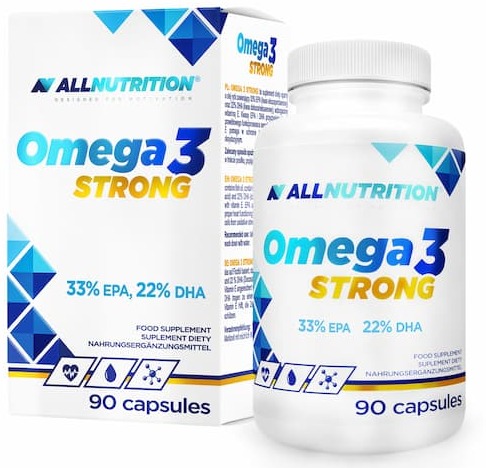
- Content omega-3 acids: 550 mg (DHA 220 mg + EPA 330 mg)
- Additional active ingredients: vitamin E
- Form: capsules .
- Dose: 1 capsule per day .
- Sufficient for: 90 days .
Product description
A dietary supplement with a solid portion of DHA and EPA – valuable for health and well-being omega-3 acidsós. Indicated especially for people on a plant-based diet, physically active people and seniors.
.The sourceóof omega-3 acids in this preparation is fish oil.
.Pros and cons
A dietary supplement with a solid portion of DHA and EPA – valuable for health and well-being omega-3 acidsós. Indicated especially for people on a plant-based diet, physically active people and seniors.
.The sourceóof omega-3 acids in this preparation is fish oil.
.Additional information
A dietary supplement with a solid portion of DHA and EPA – valuable for health and well-being omega-3 acidsós. Indicated especially for people on a plant-based diet, physically active people and seniors.
.The sourceóof omega-3 acids in this preparation is fish oil.
.User review
A dietary supplement with a solid portion of DHA and EPA – valuable for health and well-being omega-3 acidsós. Indicated especially for people on a plant-based diet, physically active people and seniors.
.The sourceóof omega-3 acids in this preparation is fish oil.
.Solgar Omega 3-6-9
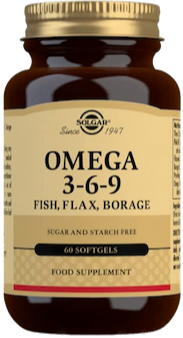
- Content of omega acids:.
- Omega-3 fatty acids.
- Omega-3 fatty acids
- alpha-linolenic acid (ALA) – 585 mg
.- eicosapentaenoic acid (EPA) – 344 mg
- docosahexaenoic acid (DHA) – 221 mg
.
- Omega-3 fatty acids
- Omega-6 fatty acids.
- linoleic acid (LA) – 598 mg .
- gamma-linolenic acid (GLA) – 274 mg .
- Omega-9 fatty acids.
- Oleic acid – 325 mg .
- Omega-3 fatty acids.
- Source of omega acids: fish oil from anchovies, mackerel, sardines, linseed oil, cucumber oil .
- Form: capsules .
- Packaging: 60 capsules .
- Daily allowance:3 capsules per day .
- Sufficient for: 20 days .
Product description
A combination of omega 3-6-9 fatty acidsós derived from fish and plants. The dietary supplement supplements essential omega fatty acids, whichóre needed for the proper functioning of many systemsóorgansóin the body.
Pros and cons
A combination of omega 3-6-9 fatty acidsós derived from fish and plants. The dietary supplement supplements essential omega fatty acids, whichóre needed for the proper functioning of many systemsóorgansóin the body.
Additional information
A combination of omega 3-6-9 fatty acidsós derived from fish and plants. The dietary supplement supplements essential omega fatty acids, whichóre needed for the proper functioning of many systemsóorgansóin the body.
A combination of omega 3-6-9 fatty acidsós derived from fish and plants. The dietary supplement supplements essential omega fatty acids, whichóre needed for the proper functioning of many systemsóorgansóin the body.
Omega + Vitamin D3 800 IU for children
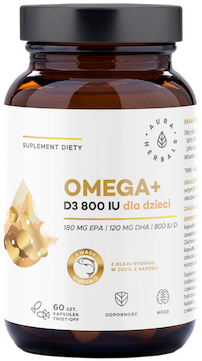
- Content of omega-3 fatty acids: 300 mg (180 mg EPA + 120 mg DHA)
- .
- Additional active ingredients: vitamin D3
- Form: twist-off capsules
- .
- Dose: 1 capsule per day
- .
- Sufficient for: 60 days
- .
Product description
Omega-3 acids for children with added vitamin D3 in good doses. The formula fills the daily requirement of EPA and DHA and vitamin D for children aged 2–18 years.
The Ministry of Health recommends supplementation with vitamin D3. In turn, omega-3 fatty acids are also crucial for the youngest.
The dietary supplement from Aura Herbals supports mós brain function, proper vision and immune system function.
The omega-3 fatty acids are derived from fish oil sourced from anchovies.
Pros and cons
Omega-3 acids for children with added vitamin D3 in good doses. The formula fills the daily requirement of EPA and DHA and vitamin D for children aged 2–18 years.
The Ministry of Health recommends supplementation with vitamin D3. In turn, omega-3 fatty acids are also crucial for the youngest.
The dietary supplement from Aura Herbals supports mós brain function, proper vision and immune system function.
The omega-3 fatty acids are derived from fish oil sourced from anchovies.
Additional information
Omega-3 acids for children with added vitamin D3 in good doses. The formula fills the daily requirement of EPA and DHA and vitamin D for children aged 2–18 years.
The Ministry of Health recommends supplementation with vitamin D3. In turn, omega-3 fatty acids are also crucial for the youngest.
The dietary supplement from Aura Herbals supports mós brain function, proper vision and immune system function.
The omega-3 fatty acids are derived from fish oil sourced from anchovies.
User review
Omega-3 acids for children with added vitamin D3 in good doses. The formula fills the daily requirement of EPA and DHA and vitamin D for children aged 2–18 years.
The Ministry of Health recommends supplementation with vitamin D3. In turn, omega-3 fatty acids are also crucial for the youngest.
The dietary supplement from Aura Herbals supports mós brain function, proper vision and immune system function.
The omega-3 fatty acids are derived from fish oil sourced from anchovies.
{ product:1ZN0pnin20IQ025sIqOBUF }}
{ product:3oXWSUGbGgIAXE0DFjTfMt }}
DHA + EPA for children
.The best DHA+EPA acids for children are Aura Herbals Omega 300 mg + Vitamin D3 800 IU. This is a high-quality dietary supplement with a child-appropriate daily dose of omega-3 fatty acids (180 mg EPA and 120 mg DHA) and vitamin D3. The twist-off capsules are easy to administer and the product lasts for up to 60 days.
EPA + DHA daily requirement
.Nutrition standards for the Polish population suggest a minimum amount of unsaturated fats in the diet to enjoy good health. Do you know how much EPA and DHA per day you need to consume?"
.Daily omega-3 fatty acid and fat requirements for infants, children and adolescents
. .|
Ingredient . |
Recommended intake . |
|
| . |
Eicosapentaenoic acid + Docosahexaenoic acid (EHA + DHA) . |
7-24 months: DHA 100 mg/day only; .2-18 years: EPA+DHA 250 mg/day |
Daily omega-3 fatty acid and fat requirements for adults
. .|
Ingredient . |
Recommended intake . |
|
| . |
Eicosapentaenoic acid + Docosahexaenoic acid (EHA + DHA) . |
250 mg |
Each country, each... different recommendations?
Every country, each... different recommendations?
According to the Polish Institute of Food and Nutrition, you should consume a minimum of 250 mg of EPA and DHAand. I've looked at data for other countries and the recommendations there - the spread is incredible. Up to 1,000 mg EPA+DHA per day is recommended for healthy adults in Brazil, Israel or the USand.
Symptoms of EPA and DHA deficiency
.Unfortunately symptoms of omega-3 fatty acid deficiency are not characteristic and may be indicative of other deficits or disease. However, if you experience the following symptoms, see your doctor to determine the cause.
A deficiency of omega-3 fatty acids can manifest itselfand:
- dryness and irritation of the skin, .
- keratosis of the epidermis, .
- dryness of the eyes,
- dryness of the eyes.
- pain and stiffness of joints, .
- hair loss, .
- lower mood, .
- fatigue, .
- lowering of immunity, .
There is a greater chance that you are deficient in EPA and DHA if you are on a plant-based diet. Although many plants contain a high content of omega-3 fatty acids, they are not as well absorbed as those from animal sources.
 .
.
Julia SkrajdaDietitian
.Sources of EPA and DHA in the diet
.The omega-3 fatty acids are produced by microalgae. When eaten, fish accumulate omega-3s - so fish meat is the best source of these acidsand. Make sure you have these fish on your menu at least once a week.
Animal sources of EPA and DHA
. .|
Product . |
EPA and DHA content per 100 g* |
|
Macre . |
3000-4000 mg |
|
Sardines |
2200-2500 mg |
|
Tran (cod liver oil) . |
2400 mg |
|
Salmon |
2100 mg |
|
Herring |
2000-3000 mg |
|
Salmon trout |
1200-1400 mg . |
|
Tuna |
1000-1500 mg |
|
Shrimp |
300-500 mg |
*The content of omega-3 fatty acids in foods may vary depending on a number of factors, e.g. how they are grown or heat treated.
See also: Best sources of omega-3s in the diet
Vegetable sources of EPA and DHA
.Unfortunately, while plants are rich in omega-3 acids in general, alpha-linolenic acid (ALA) dominates. Oils (e.g. flaxseed), nuts, seeds or legumes often appear on the menu of vegans, but these will not provide adequate amounts of EPA and DHA and will not be as well absorbed by the body.
Vegans and vegetarians who do not supplement EPA and DHA because they assume that plant sources alone will suffice, suffer severe deficiencies, concentration problems, heart problems and chronic inflammation after many years of such a diet. We cannot put an equal sign between plant and marine sources of omega-3..
 .
.
Julia SkrajdaDietitian
.People on a plant-based diet who want to take care of EPA and DHA can benefit from dietary supplements containing oil from marine algae, most commonly the Schizochytrium species.
The only good sources of EPA and DHA for vegans are marine algae, but the ratio is in favour of DHA. Therefore, it is important to watch for EPA deficiencies. It is worth doing regular blood tests, mainly regarding the risk of cardiovascular disease, and observing. Everyone's needs are different and we absorb and tolerate particular substances differently," explains the nutritionist.
.The level and need for EPA is variable and dynamic, so it may turn out that for one person on a plant-based diet, seaweed supplements will be ok. However, for another person on such a diet, seaweed may not be enough, because, for example, he or she leads a more stressful lifestyle and has a genetically increased risk of cardiovascular disease, adds Julia Skrajda.
.Dietitian advice
.When choosing an omega-3 supplement, pay attention to a slightly higher supply of EPA than DHA, because these also compete with each other. EPA is necessary throughout life, DHA mainly in infancy, childhood and senior years. DHA levels in the body stabilise around the age of 5, and the need for EPA is quite dynamic and variable. The ratio of EPA to DHA supply should be 2:1.

Sprawdź, za co pokochały go tysiące klientek Natu.Care Premium Omega-3ᵀᴳ -15% z kodem BLOG15
Natu.Care Omega-3ᵀᴳ Premium
Natu.Care Omega-3ᵀᴳ Premium dla zdrowia serca, mózgu i odporności. Najlepsza przyswajalność. Optymalna dawka 750 mg. Przebadana przez niezależne laboratorium.
Zobacz więcej
Produkt ma super skład, transparentną etykietę i co dla mnie jest ważne – małe kapsułki do połknięcia. Nie ma też nieprzyjemnego efektu odbijania rybą, który miałam spożywając inne produkty. Widzę znaczną poprawę odporności. Polecam!@Kasia P.
Summary
.- Eicosapentaenoic acid (EPA) and docosahexaenoic acid (DHA) are fats of the omega-3 family of acids.
- Acting in synergy, EPA and DHA support the function of the organ of vision and the nervous, cardiovascular and immune systems, affect mental health, inflammation control and skin condition.
- An adult should consume a minimum of 250 mg EPA+DHA daily. .
- The best sources of EPA and DHA are fatty marine fish, e.g. mackerel, salmon, sardines. .
- Vegans can supplement EPA and DHA from preparations containing omega-3 fatty acids from marine algae. .
FAQ
.What EPA+DHA do you recommend?
.Recommended omega-3 acids DHA+EPA with good composition are Natu.Care Omega-3 ᵀᴳ Premium with a serving of 500 mg EPA acid and 250 mg DHA acid. Taking 1 capsule a day supplements the diet with valuable fats and lasts for 60 days of supplementation. And the supplement has laboratory tests for E. Coli.
What are the best EPA+DHA acids?
.The best EPA+DHA acids can be found in dietary supplements with omega-3 acids in the triglyceride form. This form is assimilated up to 2 times better than the popular esters on the supplement market. A recommended preparation with triglycerides is Natu.Care Omega-3 TG with 750 mg EPA+DHA in 1 daily serving.
Can you overdose on DHA/EPA?
.Yes, it is possible to overdose on the fatty acids DHA and EPA, but this is a very rare occurrence that most often happens through over-supplementation. The body naturally gets rid of excess omega acids. Furthermore, it is impossible to overdose on DHA from food. Special care should be taken when taking tran, which contains a lot vitamin A.
Do you get fat after DHA?
.The acid DHA is contained in the group of omega-3 acids. It belongs to the fats that have 9 kcal/1 g. If you consume a lot of fats from foods and exceed your daily kilocalorie requirement, you may gain weight. DHA supplementation is not calorific - one capsule has about 10 kcal.
.What is more important EPA or DHA?
.Both DHA and EPA are important for the proper functioning of the body. Each has its own functions in maintaining good health and well-being, e.g. DHA is particularly important for brain and eye development in infants and children, and EPA is associated with reducing inflammation in the body. Both should be provided with food or dietary supplements.
Who should supplement EPA+DHA?
.Supplementation with omega-3 fatty acids (EPA+DHA) is recommended:
.- vegans and vegetarians, .
- persons who consume little fish, .
- children during periods of intensive growth, .
- seniors, .
- patients undergoing cardiac treatment and prevention of heart disease,
- patients undergoing cardiac treatment and prevention of heart disease.
- people with autoimmune diseases, e.g. rheumatoid arthritis (RA), Hashimoto's disease, psoriasis. .
- allergic people, .
- people who are physically active, .
Is EPA acid harmful?
.No, EPA acid is not harmful and is considered safe to consume if you follow the recommended daily portions. However, people with haemorrhagic diathesis or seafood allergies should consult a specialist before starting EPA acid supplementation. Potential interactions with medications should be discussed with your doctor.
Resources
.See all
.A fish a day, keeps the cardiologist away! - A review of the effect of omega-3 fatty acids in the cardiovascular system-PMC. (n.d.). Retrieved October 3, 2023, from https://www.ncbi.nlm.nih.gov/pmc/articles/PMC3712371/
Calder, P. C. (2010). Omega-3 Fatty Acids and Inflammatory Processes. Nutrients, 2(3), 355-374. https://doi.org/10.3390/nu2030355
Dyall, S. C. (2015). Long-chain omega-3 fatty acids and the brain: A review of the independent and shared effects of EPA, DPA and DHA. Frontiers in Aging Neuroscience, 7, 52. https://doi.org/10.3389/fnagi.2015.00052
EFSA Panel on Dietetic Products, Nutrition and Allergies (NDA). (2012). Scientific Opinion on the Tolerable Upper Intake Level of eicosapentaenoic acid (EPA), docosahexaenoic acid (DHA) and docosapentaenoic acid (DPA). EFSA Journal, 10(7), 2815. https://doi.org/10.2903/j.efsa.2012.2815
Elbahnasawy, A. S., Valeeva, E. R., El-Sayed, E. M., & Stepanova, N. V. (2019). Protective effect of dietary oils containing omega-3 fatty acids against glucocorticoid-induced osteoporosis. Journal of Nutrition and Health, 52(4), 323-331. https://doi.org/10.4163/jnh.2019.52.4.323
Guesnet, P., & Alessandri, J.-M. (2011). Docosahexaenoic acid (DHA) and the developing central nervous system (CNS)-Implications for dietary recommendations. Biochimie, 93(1), 7-12. https://doi.org/10.1016/j.biochi.2010.05.005
Guo, Y., Ma, B., Li, X., Hui, H., Zhou, Y., Li, N., & Xie, X. (2022). Omega-3 Polyunsaturated Fatty Acids Can Reduce IL-6 and TNF Levels in Patients with Cancer. The British Journal of Nutrition, 1-34. https://doi.org/10.1017/S0007114522000575
Kavyani, Z., Musazadeh, V., Fathi, S., Hossein Faghfouri, A., Dehghan, P., & Sarmadi, B. (2022). Efficacy of the omega-3 fatty acids supplementation on inflammatory biomarkers: An umbrella meta-analysis. International Immunopharmacology, 111, 109104. https://doi.org/10.1016/j.intimp.2022.109104
Khalili, L., Valdes-Ramos, R., & Harbige, L. S. (2021). Effect of n-3 (Omega-3) Polyunsaturated Fatty Acid Supplementation on Metabolic and Inflammatory Biomarkers and Body Weight in Patients with Type 2 Diabetes Mellitus: A Systematic Review and Meta-Analysis of RCTs. Metabolites, 11(11), 742. https://doi.org/10.3390/metabo11110742
Kiecolt-Glaser, J. K., Belury, M. A., Andridge, R., Malarkey, W. B., & Glaser, R. (2011). Omega-3 supplementation lowers inflammation and anxiety in medical students: A randomized controlled trial. Brain, Behavior, and Immunity, 25(8), 1725-1734. https://doi.org/10.1016/j.bbi.2011.07.229
Kruger, M. C., Coetzer, H., de Winter, R., Gericke, G., & van Papendorp, D. H. (1998). Calcium, gamma-linolenic acid and eicosapentaenoic acid supplementation in senile osteoporosis. Aging (Milan, Italy), 10(5), 385-394. https://doi.org/10.1007/BF03339885
Leaf, A. (2008). Historical overview of n-3 fatty acids and coronary heart disease. The American Journal of Clinical Nutrition, 87(6), 1978S-80S. https://doi.org/10.1093/ajcn/87.6.1978S
Li, J., Xun, P., Zamora, D., Sood, A., Liu, K., Daviglus, M., Iribarren, C., Jacobs, D., Shikany, J. M., & He, K. (2013). Intakes of long-chain omega-3 (n-3) PUFAs and fish in relation to incidence of asthma among American young adults: The CARDIA study123. The American Journal of Clinical Nutrition, 97(1), 181-186. https://doi.org/10.3945/ajcn.112.041145
Liao, Y., Xie, B., Zhang, H., He, Q., Guo, L., Subramanieapillai, M., Fan, B., Lu, C., & McIntyre, R. S. (2019). Efficacy of omega-3 PUFAs in depression: A meta-analysis. Translational Psychiatry, 9, 190. https://doi.org/10.1038/s41398-019-0515-5
Liu, G., Liu, J., Pian, L., Gui, S., & Lu, B. (2019). α-lipoic acid protects against carbon tetrachloride-induced liver cirrhosis through the suppression of the TGF-β/Smad3 pathway and autophagy. Molecular Medicine Reports, 19(2), 841-850. https://doi.org/10.3892/mmr.2018.9719
Mano, Y., Kato, A., Fukuda, N., Yamada, K., & Yanagimoto, K. (2022). Influence of Ingestion of Eicosapentaenoic Acid-Rich Fish Oil on Oxidative Stress at the Menstrual Phase: A Randomized, Double-Blind, Placebo-Controlled, Parallel-Group Trial. Women's Health Reports, 3(1), 643-651. https://doi.org/10.1089/whr.2022.0003
Marine Oils. (2006). In Drugs and Lactation Database (LactMed®). National Institute of Child Health and Human Development. http://www.ncbi.nlm.nih.gov/books/NBK501898/
Martins, J. G. (2009). EPA but not DHA appears to be responsible for the efficacy of omega-3 long chain polyunsaturated fatty acid supplementation in depression: Evidence from a meta-analysis of randomized controlled trials. Journal of the American College of Nutrition, 28(5), 525-542. https://doi.org/10.1080/07315724.2009.10719785
Merle, B. M. J., Benlian, P., Puche, N., Bassols, A., Delcourt, C., Souied, E. H., & Nutritional AMD Treatment 2 Study Group. (2014). Circulating omega-3 Fatty acids and neovascular age-related macular degeneration. Investigative Ophthalmology & Visual Science, 55(3), 2010-2019. https://doi.org/10.1167/iovs.14-13916
Mohajeri, M. H., Troesch, B., & Weber, P. (2015). Inadequate supply of vitamins and DHA in the elderly: Implications for brain aging and Alzheimer-type dementia. Nutrition (Burbank, Los Angeles County, Calif.), 31(2), 261-275. https://doi.org/10.1016/j.nut.2014.06.016
Montgomery, P., Burton, J. R., Sewell, R. P., Spreckelsen, T. F., & Richardson, A. J. (2014). Fatty acids and sleep in UK children: Subjective and pilot objective sleep results from the DOLAB study--a randomized controlled trial. Journal of Sleep Research, 23(4), 364-388. https://doi.org/10.1111/jsr.12135
Nelson, J. R., Wani, O., May, H. T., & Budoff, M. (2017). Potential benefits of eicosapentaenoic acid on atherosclerotic plaques. Vascular Pharmacology, 91, 1-9. https://doi.org/10.1016/j.vph.2017.02.004
Docosahexaenoic acid supplementation decreases liver fat content in children with non-alcoholic fatty liver disease: Double-blind randomised controlled clinical trial. Archives of Disease in Childhood, 96(4), 350-353. https://doi.org/10.1136/adc.2010.192401
Oelrich, B., Dewell, A., & Gardner, C. D. (2013). Effect of fish oil supplementation on serum triglycerides, LDL cholesterol and LDL subfractions in hypertriglyceridemic adults. Nutrition, Metabolism, and Cardiovascular Diseases: NMCD, 23(4), 350-357. https://doi.org/10.1016/j.numecd.2011.06.003
Office of Dietary Supplements-Omega-3 Fatty Acids. (n.d.). Retrieved October 3, 2023, from https://ods.od.nih.gov/factsheets/Omega3FattyAcids-Consumer/
Oliveira, J. M., & Rondó, P. H. C. (2011). Omega-3 fatty acids and hypertriglyceridemia in HIV-infected subjects on antiretroviral therapy: Systematic review and meta-analysis. HIV Clinical Trials, 12(5), 268-274. https://doi.org/10.1310/hct1205-268
Omega-3 fatty acids' supplementation in Alzheimer's disease: A systematic review-PubMed. (n.d.). Retrieved October 3, 2023, from https://pubmed.ncbi.nlm.nih.gov/28466678/
Omega-3-6-9 Fatty Acids: A Complete Overview. (2020, October 5). Healthline. https://www.healthline.com/nutrition/omega-3-6-9-overview
Pahwa, R., Goyal, A., & Jialal, I. (2022). Chronic Inflammation. In StatPearls. StatPearls Publishing. http://www.ncbi.nlm.nih.gov/books/NBK493173/
.Parke, M. A., Perez-Sanchez, A., Zamil, D. H., & Katta, R. (2021). Diet and Skin Barrier: The Role of Dietary Interventions on Skin Barrier Function. Dermatology Practical & Conceptual, 11(1), e2021132. https://doi.org/10.5826/dpc.1101a132
Perera, H., Jeewandara, K. C., Seneviratne, S., & Guruge, C. (2012). Combined ω3 and ω6 supplementation in children with attention-deficit hyperactivity disorder (ADHD) refractory to methylphenidate treatment: A double-blind, placebo-controlled study. Journal of Child Neurology, 27(6), 747-753. https://doi.org/10.1177/0883073811435243
Peuhkuri, K., Sihvola, N., & Korpela, R. (2012). Dietary factors and fluctuating levels of melatonin. Food & Nutrition Research, 56, 10.3402/fnr.v56i0.17252. https://doi.org/10.3402/fnr.v56i0.17252
Ramel, A., Martinez, J. A., Kiely, M., Bandarra, N. M., & Thorsdottir, I. (2010). Moderate consumption of fatty fish reduces diastolic blood pressure in overweight and obese European young adults during energy restriction. Nutrition (Burbank, Los Angeles County, Calif.), 26(2), 168-174. https://doi.org/10.1016/j.nut.2009.04.002
Ross, B. M. (2007). Omega-3 fatty acid deficiency in major depressive disorder is caused by the interaction between diet and a genetically determined abnormality in phospholipid metabolism. Medical Hypotheses, 68(3), 515-524. https://doi.org/10.1016/j.mehy.2006.07.054
Theodoratou, E., McNeill, G., Cetnarskyj, R., Farrington, S. M., Tenesa, A., Barnetson, R., Porteous, M., Dunlop, M., & Campbell, H. (2007). Dietary fatty acids and colorectal cancer: A case-control study. American Journal of Epidemiology, 166(2), 181-195. https://doi.org/10.1093/aje/kwm063
Thomsen, B. J., Chow, E. Y., & Sapijaszko, M. J. (2020). The Potential Uses of Omega-3 Fatty Acids in Dermatology: A Review. Journal of Cutaneous Medicine and Surgery, 24(5), 481-494. https://doi.org/10.1177/1203475420929925
Wani, A. L., Bhat, S. A., & Ara, A. (2015). Omega-3 fatty acids and the treatment of depression: A review of scientific evidence. Integrative Medicine Research, 4(3), 132-141. https://doi.org/10.1016/j.imr.2015.07.003
Wawryszuk, N. (2023). Omega acids. Everything you need to know. (B. Turczynski, Ed.; 1st ed.). Natu.Care. https://books.google.com/books?vid=9788396887818
.Wielgosz, Ph.D., R.W., Prof NIZP PZH-PIB, M.Sc. Justyna. (2020, July 27). The importance of docosahexaenoic acid (DHA) during pregnancy and lactation. National Centre for Nutrition Education. https://ncez.pzh.gov.pl/ciaza-i-macierzynstwo/znaczenie-kwasu-dokozaheksaenowego-dha-w-okresie-ciazy-i-laktacji/
Wooten, J. S., Biggerstaff, K. D., & Ben-Ezra, V. (2009). Responses of LDL and HDL particle size and distribution to omega-3 fatty acid supplementation and aerobic exercise. Journal of Applied Physiology, 107(3), 794-800. https://doi.org/10.1152/japplphysiol.91062.2008
Editorials
Meet the team



Omega-3 fatty acids are a useful dietary supplement for active people - improves performance and fitness.
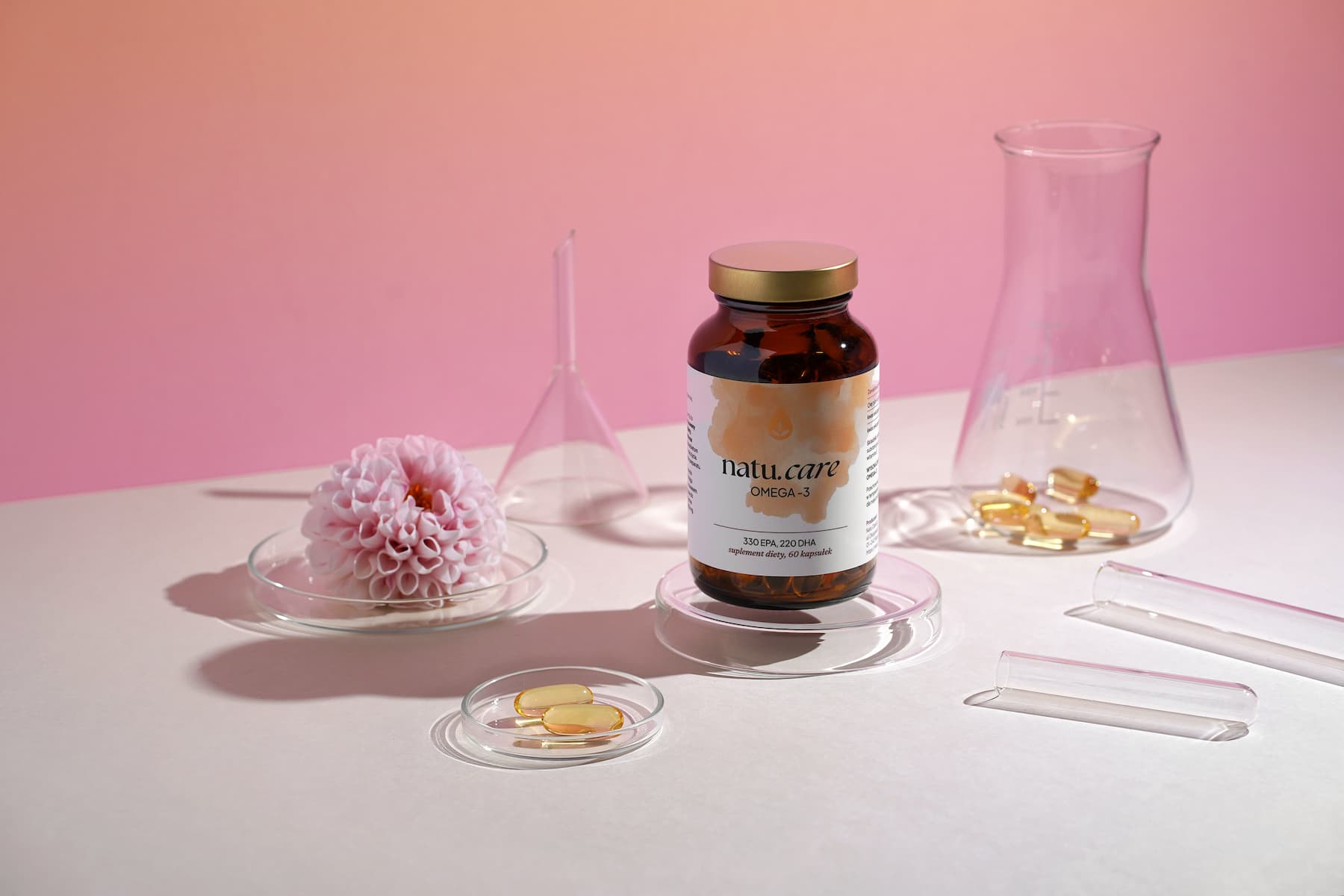
Omega-3 in a good dose and an optimum ratio of DHA and EPA acids will replenish valuable fats in the diet.
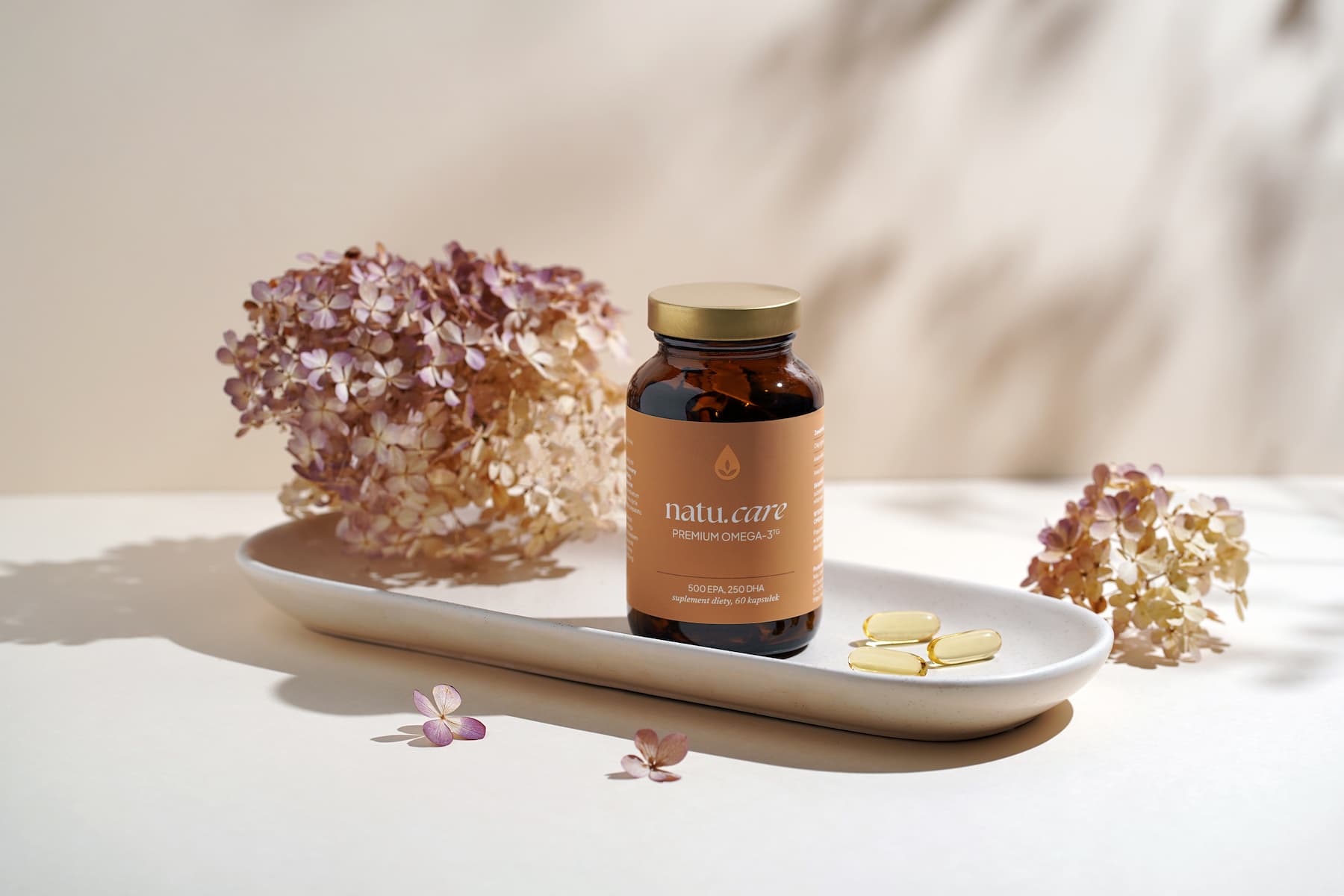
The omega-3 acids from Natu.Care are distinguished by their triglyceride form, which is characterised by high bioavailability.
